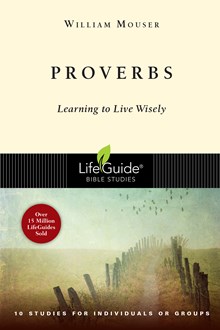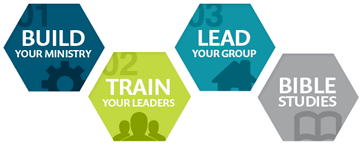Overview
In ten inductive studies, you will discover the meaning of prosperity in your work, your dealings with family and friends, and your relationship with God.
Introduction
Getting the Most Out of Proverbs
This section introduces the topic, explains the structure followed in each study and offers tips for those approaching the study on their own as well as those participating in a group.
Session One
The Choice
IProverbs 9 is an extended metaphor—an allegory. Wisdom is like a wealthy woman inviting guests to a feast. Who embodies the person of Lady Wisdom in their relationship to you? How have you encountered Woman Folly?
Proverbs 9
Session Two
The Simple
The first practical step to wisdom is to identify the simpleton in ourselves. All of us have spheres of living where we, like the simpleton in Proverbs 7, have little choice but to believe what we are told. What are some of these areas in your life?
Proverbs 7
Session Three
Avoiding the Fool
Proverbs 18:2 tells us that fools are always ready with a viewpoint and ever eager to broadcast it. How would you expect a prudent or wise person to behave differently? Give an example.
Proverbs 13:19; 17:12; 18:2, 7; 20:3; 26:11
Session Four
Finding Wisdom
Sometimes acquiring wisdom will feel unpleasant. Give an example from your own life where learning wisdom cost you something in terms of personal pain.
Proverbs 13:10; 20; 14:12; 15:12; 21:30; 25:12
Session Five
Bad Words
Suppose you hear an inflammatory report about someone else. By hearing it, do you show yourself to be wicked or a liar? Why or why not?
Proverbs 6:12-14; 16:30; 17:4; 18:8; 26:23; 29:5
Session Six
Good Words
Proverbs 10:19 suggests that the mere quantity of words produces sin. Why do you think that quantity alone is apt to produce sin in our own words?
Proverbs 10:19; 15:23; 16:24; 17:10; 24:26; 25:11-12
Session Seven
The Sluggard
Proverbs 15:19 shows us a surprising thing—a sluggard works harder than anyone else (that is, when he or she works at all). Why?
Proverbs 6:6-8; 13:4; 15:9; 22:13; 24:30-34; 26:14-16
Session Eight
Wealth & Poverty
The proverbs tell us it is foolish to suppose that wealth is an an unmixed blessing and that poverty is always a curse. What do you see to be some of the disadvantages of wealth?
Proverbs 10:4, 15, 22; 13:8; 18:11, 23; 19:4; 21:6; 30:8-9
Session Nine
Giving
Suppose the mail carrier brings you a request for money to feed hungry orphans in some far-off land and you throw this appeal into the wastepaper basket. Is your action going to call down on yourself the calamity Proverbs 21:13 speaks about? Explain.
Proverbs 14:21, 31; 19:6, 17; 21:13
Session Ten
Planning the Future
We usually evaluate a plan according to its merits, not on the basis of the character of the planner. Why does a planner's character make a difference?
Proverbs 11:3; 14:12; 15:22; 16:9; 21:5, 31: 27:1
Total number of pages—81 pages
William Mouser earned his Th.M. at Dallas Seminary, where he specialized in Old Testament and Semitic languages. A former pastor, he is now director of the International Council for Gender Studies, based near Dallas, Texas.





